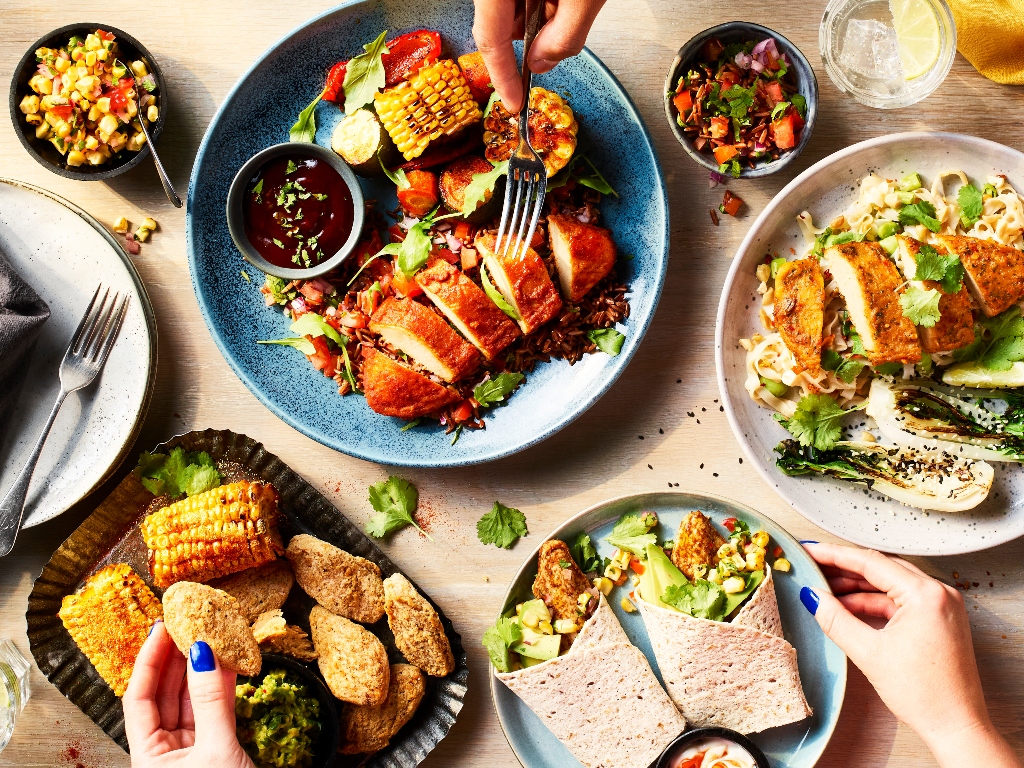Vegan Chicken: Why It’s Better For The Environment, The Animals, And For Us Too
13 Mins Read
Whether it’s fried, roasted, boiled, or barbecued, in many countries around the world, chicken is a big deal. It’s the most-loved meat in the US, where, on average, Americans eat more than 200 pounds of it every year. In European Union countries, poultry meat consumption hit 11.9 million tons in 2020.
Chicken meat is popular because it’s usually more affordable than other options, it’s also incredibly versatile and generally easy to prepare. But it also comes with some major problems. Most chicken meat is a product of intensive poultry farming. This method of production is a disease risk, a threat to the environment, and raises some serious welfare concerns. But for the world’s chicken lovers, there is an alternative.
Vegan chicken has the same taste, texture, and versatility as regular chicken meat, only it’s better for the planet and, in many ways, human health. And because of that, it’s becoming more popular than ever.
The last few years have seen a boom in vegan chicken production, as plant-based brands rush to satisfy consumers who love the real thing. In fact, one report claims that this rising demand for vegan chicken products is playing a significant role in the overall growth of the global plant-based meat market, which is predicted to hit more than $15 billion by 2027.
We’ve gathered a few of the best vegan chicken brands on the market. But first, let’s take a deeper dive into the issues with conventional chicken, and examine everything you need to know about its more sustainable vegan counterpart.
What’s wrong with chicken?
At the beginning of the 21st century, there were 14.3 billion chickens in the world. Now, this has more than doubled, with estimates stating there were roughly 33 billion. Most of the chickens alive today—who are farmed all over the world, but mostly in Europe, the US, and China—are either egg-laying hens or broiler birds (raised for meat).
Compassion In World Farming estimates that 70 percent of the world’s broiler chickens are raised in intensive poultry farms, which are mostly cramped, barren, and filthy. In the US, and more recently the UK, so-called “mega-farms” have been known to pack in more than one million birds to maximize profit. Each chicken often has less space to move around than the size of one sheet of A4 paper.
These conditions are not only detrimental to chicken welfare—many are bred to grow so fast their legs buckle underneath them, or they become so stressed they start pecking each other’s feathers out—but also human health. In order to prevent disease in these conditions, farmers often resort to antibiotic use.
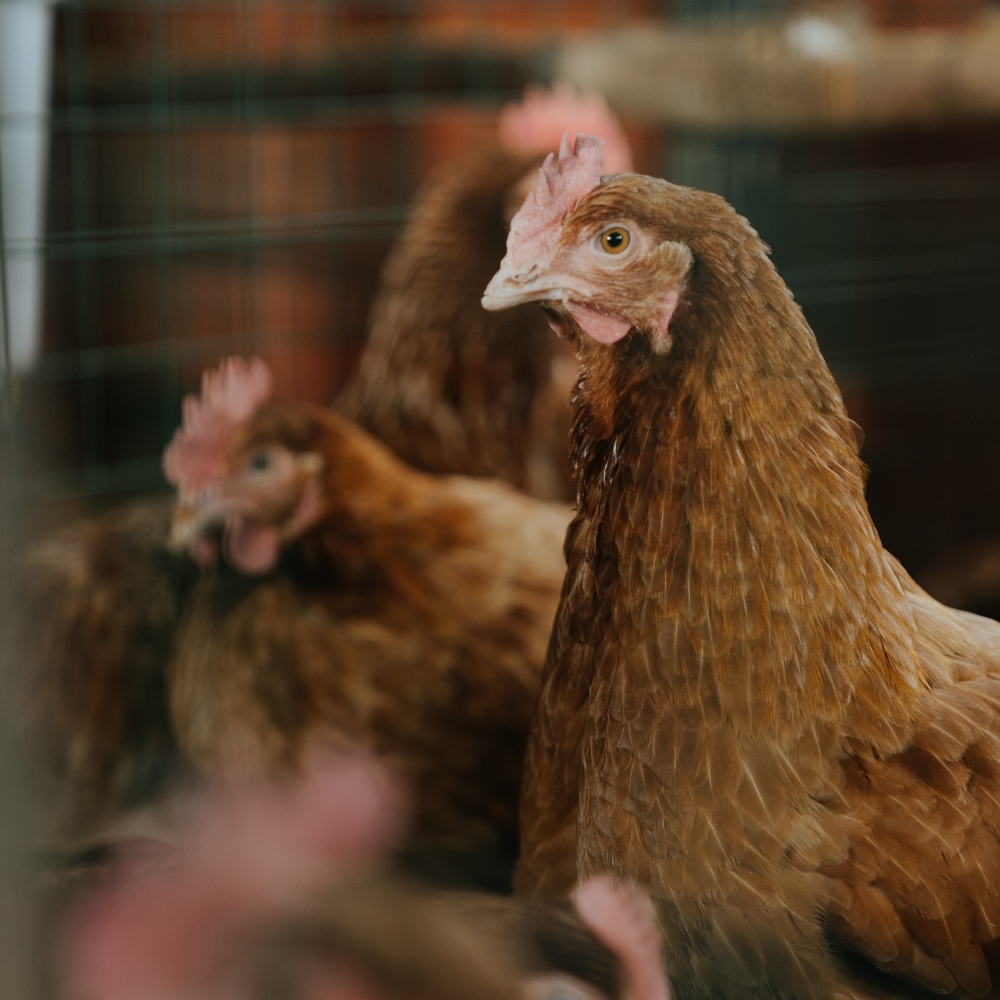
Antiobiotics and disease
In 2017, one investigation found that 281 tonnes of ionophores, a type of antibiotics, were sold to UK poultry farmers to prevent coccidiosis. The disease impacts birds when they consume their own droppings, which is all but inevitable on factory farms.
Overuse of antibiotics contributes to the growing threat of resistance. When drugs are used too much, germs start to mutate so they can’t defeat them anymore. According to the Centers for Disease Control and Prevention, antibiotic resistance is already causing around 23,000 human deaths in the US.
Unfortunately, it gets worse. Industrial farming conditions are not only contributing to antibiotic resistance but also, potentially, the next pandemic. This year has seen some of the worst outbreaks of bird flu on record, with birds kept inside for months on end (to the point where their eggs could no longer be legally labeled “free range”), and even culled in their thousands.
These outbreaks of influenza could have serious consequences. Last year, Dr. Michael Greger, a plant-based diet advocate, medical doctor, and author, told the Guardian: “In evolutionary terms, rearing poultry, cattle, and pigs in high-intensity, crowded, confined, entirely unnatural conditions may be the most profound alteration of the human-animal relationship in 10,000 years.”
He added: “We are seeing an unprecedented explosion in outbreaks of new bird flu viruses, which historically have presented the greatest pandemic risk and certainly have the potential to be worse than Covid.”
Is chicken healthy?
Antibiotic resistance and disease risk aside, chicken—which is high in protein but low in fat—is often regarded as healthy.
But consuming it doesn’t come without risks. Poultry can contain Salmonella bacteria, for example. If the meat is not cooked properly, this can cause salmonellosis, which can result in symptoms like fever or diarrhea.
Some research also suggests that chicken consumption may increase the risk of cancer. One study from the University of Oxford examined the eating habits of more than 475,000 adults aged between 37 and 73. They found that chicken was positively associated with some types of cancer, including prostate and non-Hodgkin’s lymphoma.
Many experts have claimed that the research is insufficient on its own, as it only shows an association. It doesn’t prove that chicken directly causes cancer. Cancer charities, including Lyphoma Action, have also stated there is not enough evidence to link chicken consumption and cancer.
That said, the Physicians Committee for Responsible Medicine, a nonprofit health organization with more than 12,000 physician members, maintains that “chicken is not a healthy choice.” It states that the meat raises cholesterol levels, contains a carcinogen called PhIP, and increases the risk of food-borne illnesses.

Chicken and the environment
When you think of the meat industry’s environmental impact, it’s likely the first animal that comes to mind is a cow. Without a doubt, the beef industry is terrible for the planet. Just one cow can belch 220 pounds of methane, a potent greenhouse gas, every year. And cattle farming is a leading cause of deforestation, as trees are often cleared to make way for new ranches.
But chicken farming also affects the environment in a big way. For example, their feed often includes soy, another key driver of deforestation. Around the world, most soy (around 80 percent) is cultivated for animal feed, not human consumption. According to one analysis, in the 11 years before 2019, more than 17,000 square kilometers of the Cerrado biome—a hotspot for biodiversity and South America’s largest savanna region—was cleared for soy plantations.
Another major environmental issue with chicken farming is water pollution. Intensive poultry farms produce ammonia gas, due to nitrogen in the animals’ manure. This not only poisons the chickens themselves but also areas around farms. In 2020, in Wales, intensive poultry farms were the suspected cause of algal blooms in the River Wye, the UK’s fourth-longest river.
At the time, James Byrne of Wildlife Trusts Wales told the Guardian: “The most likely cause of this is manure from livestock units which is spread onto land and then runs into rivers triggering eutrophication. This removes oxygen from the river, which then affects the entire river ecosystem, aquatic insects, and everything that feeds on them including birds, water shrews, fish, and otters.”
What is vegan chicken?
Unlike conventional chicken, vegan chicken offers a similar taste and texture, only without many of the health and environmental risks. It can be made from a number of plant-based ingredients, but soy and pea protein are some of the most popular with brands. (While soy can be linked with deforestation, again, the significant majority of this is linked to the livestock industry, and it is possible to source more sustainably grown versions.)
Other ingredients used to mimic the taste and feel of chicken include tofu, seitan, and mushrooms. In fact, one mushroom tastes so much like animal meat, it is even nicknamed “chicken of the woods.”
Vegan chicken nutrition
The nutritional value of vegan chicken depends on what type you’re eating, but pretty much all varieties are high in protein. Seitan, for example, contains a whopping 75 grams of protein per 100 grams. Tofu contains roughly eight grams per 100 grams, while mushrooms also offer a wealth of vitamins and minerals, including b vitamins and selenium.
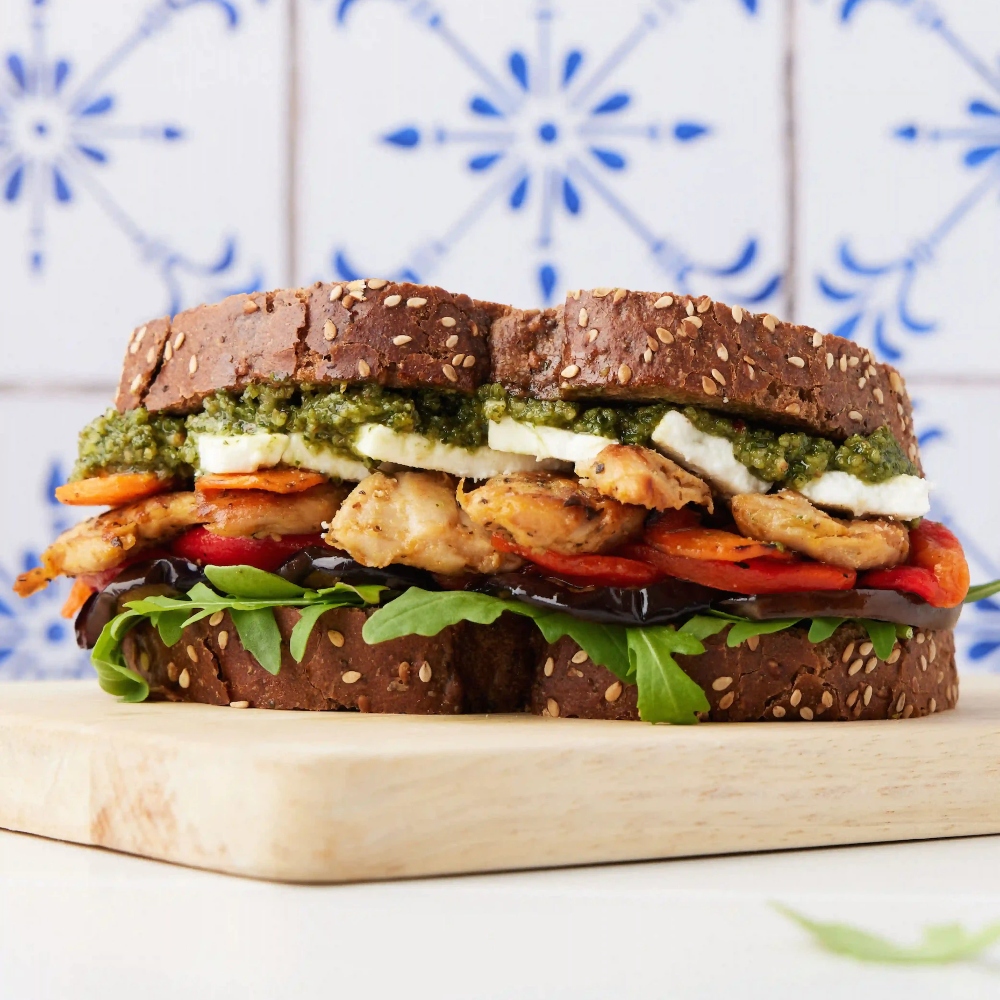
Vegan chicken brands
1. Heura
Founded in 2017, Barcelona brand Heura is all about food activism, aka saving the planet and transforming people’s eating habits with tasty, nutritious vegan products. As well as plant-based beef and pork, the brand offers a range of plant-based chicken fillets, nuggets, chunks, and more, all of which are made with sustainably-sourced soy.
Heura’s products are available in stores and restaurants across Europe and can be ordered online from several places, including The Vegan Kind and Planet Organic in the UK and Green Common in Hong Kong.
2. Alpha Foods
California-based Alpha Foods has been around since 2015, and the brand prides itself on offering antibiotic-free, cholesterol-free, environmentally-friendly plant-based products. Its vegan chicken range includes Grilled Chik’n Strips, a Sizzlin’ Spicy Chik’n patty, a Chik’n Verde Tamale.
Alpha Foods is available to buy from retailers across the US and Canada, and Hong Kong customers can order its products from Green Common.
3. Gardein
Gardein, which has been in the plant-based meat game since 2003, is known for its extensive range of vegan meats. As well as fishless, beefless, and porkless products, it offers Plant-Based Chick’n Tenders, Crispy Chick’n Sliders, Seven Grain Crispy Tenders, Mandarin Orange Crispy Chick’n, and so much more.
Gardein’s products are sold in supermarkets in a number of countries, including the US, Canada, Australia, and New Zealand. Customers in Hong Kong can also order the brand’s products from Green Common.
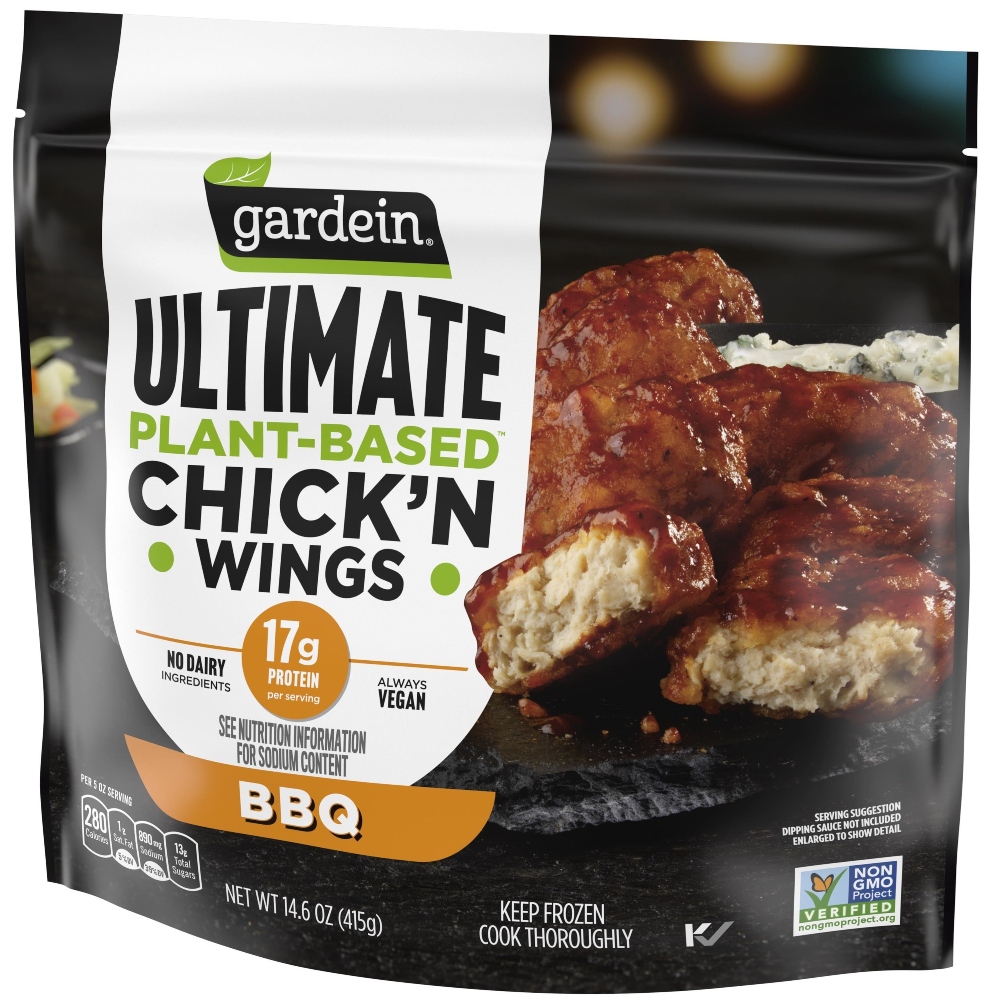
4. Quorn
British brand Quorn uses mycoprotein, a fermented fungi, to make its ultra-meaty line of vegan and vegetarian meat products. It recently expanded its vegan chicken range with Crunchy Fillet Burgers, Unicorn Nuggets, and Buffalo Fillets, but one of its best-sellers is its Vegan Pieces, which can be subbed into curries, pasta, fajitas, and more.
Quorn is available in supermarkets and stores in 14 countries around the world, but customers can also order its products from Amazon and, in some places, directly from its website.
5. Daring
With just a handful of ingredients, including soy, spices, and oil, California-based Daring Foods has managed to make one of the most convincing-looking and realistic-tasting vegan chicken products on the market. Its three products, Original, Breaded, and Cajun, have the same texture and mouthfeel as regular chicken and can be added to stir-fries, curries, pasta, and more for that much-needed protein boost.
The brand is so good, it has even caught the attention of vegan connoisseur and musician Travis Barker and his wife, Poosh founder and reality TV star, Kourtney Kardashian Barker. Both starred in one of Daring’s advertising campaigns earlier this year.
Find Daring in stores, cafes, and restaurants across the US, including Monty’s Good Burger, Bluestone Lane, Whole Foods, Publix, and Walmart.
6. VFC
Forget KFC, VFC can deliver all the same crunch and moreish flavor, without using any animal products whatsoever. Instead, its signature ingredients are wheat protein and cornflakes (for the coating).
The brand’s products, which include Chick’n Fillets, Chick’n Bites, and Popcorn Chick’n, are currently available from the UK only, in select Tesco, Sainsbury’s, and Asda supermarkets, as well as some wholesalers and vegan stores. But keep an eye out, because the brand just bagged itself more than $10 million in funding for international expansion.
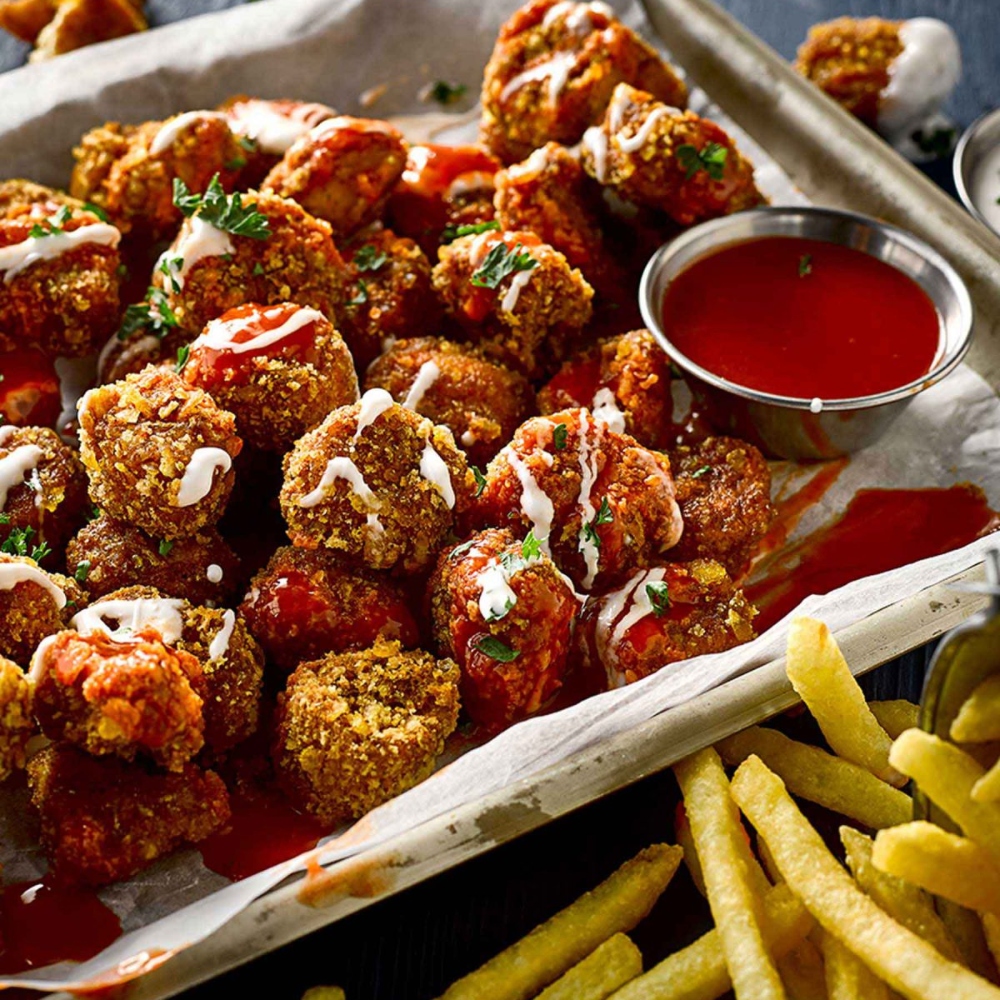
7. Impossible Foods
Impossible Foods is known for its meaty Impossible Burgers, which are available across the US and Canada, and even sold in US Burger King locations (in the Impossible Whopper). But the brand also makes Impossible ‘Chicken’ Patties and Nuggets, which are available in most “grocery stores in most states,” according to the brand. The Impossible Nuggets also recently launched in the UK and can be found in Hungry Horse pubs among other locations. Select Hong Kong grocery stores, including U Select and CitySuper, also stock the nuggets.
8. Beyond Meat
Similar to Impossible Foods, Beyond Meat is known for its “bleeding” realistic beef-like patties. But the California-based brand has branched out, and now its portfolio includes sausages, meatballs, and, you guessed it, chicken. You can find the brand’s crispy Beyond Tenders, Popcorn Chicken, and Nuggets in stores like Ralphs Grocery, CVS, Sprouts, and Whole Foods in the US.
9. TiNDLE
TiNDLE isn’t your average vegan brand. It was made by chefs, for chefs. Its tasty, versatile plant-based chicken is designed to be used in restaurant-quality dishes. Despite only launching last year, it can already be found on menus around the world, including Brewdog pubs in the UK, Big Birdy in Hong Kong, and Veggie Grill and Beyond Sushi in the US.
10. THIS
UK brand THIS knows how to make a vegan chicken product so convincing, you’ll have to check the packaging twice, and then once more. The realistic texture of its products has seen the brand soar in popularity, and recently, it even debuted a line of ready-to-eat sandwiches—including THIS Isn’t Chicken & Sweetcorn and THIS Isn’t Chicken & Stuffing—with popular British retailer (and airport favorite) WH Smith.
Elsewhere, the brand’s wide selection of chilled vegan chicken (and bacon, sausages, mince, and burgers) can be found in a number of UK supermarkets, including Tesco, Sainsbury’s, Morrisons, and Asda.
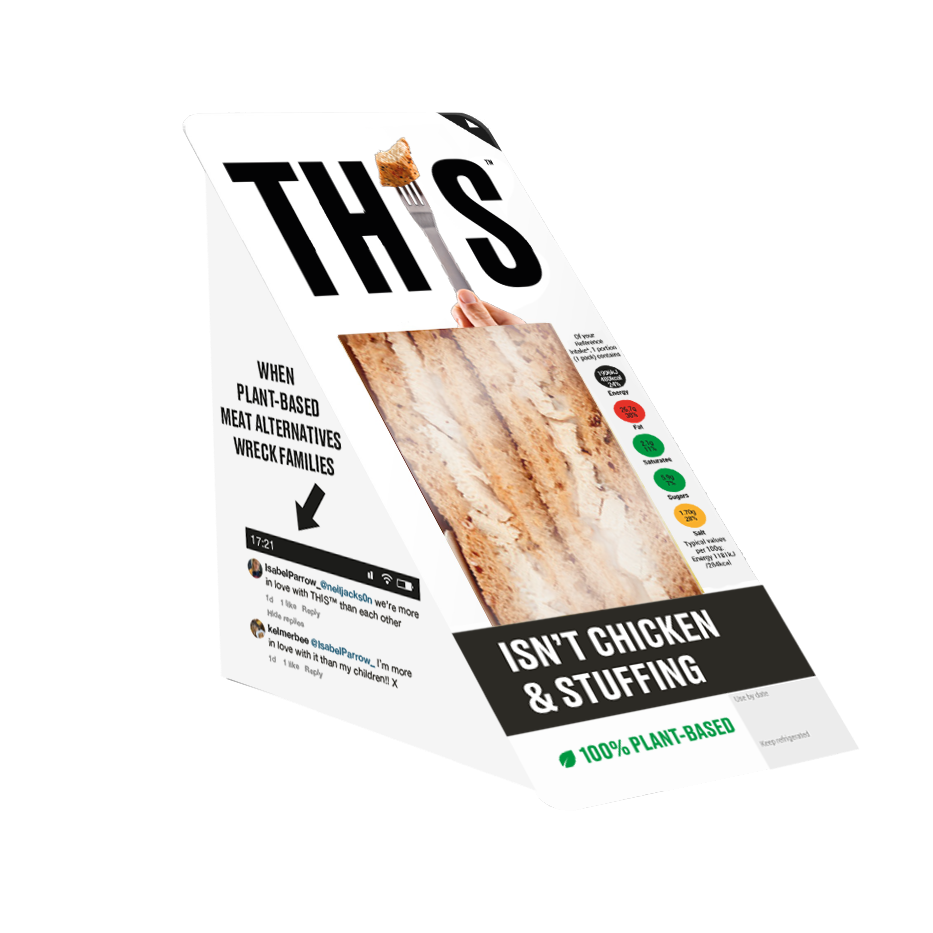
11. Morningstar Farms
Whatever your vegan or vegetarian dinner desire is, Kelloggs-owned vegan brand Morningstar Farms can (probably) make it happen. The brand’s wide range of products includes Veggie Corn Dogs, Veggie Sausage Pizza Bites, and all sorts of vegan chicken varieties. Its Chik’n Nuggets come in various flavors, like BBQ, Zesty Ranch, and Sweet Mustard, and it also offers a range of vegan nuggets in its Incogmeato range. Plus, its signature Veggitizers have a few chicken-style options, including Veggie Chik’n & Cheeze Taquito Bites.
Morningstar Farms is sold in a number of locations across the US, including Target. You can also order its products online from Amazon or Instacart, and from Ubuy in Hong Kong.
12. Simulate
Unlike many vegan brands, Simulate (which used to be known as NUGGS) is proud of the fact that its vegan chicken is highly processed and pro-GMO. The Manhattan-based brand delivers on its name and gives customers a version of vegan chicken that is a perfect simulation of the real deal. While Simulate’s plant-based products are lab-made, they shouldn’t be confused with lab-grown meat (which features real animal cells and isn’t widely available yet).
Try the simulation for yourself and find the brand’s products in select Walmart, Whole Foods, and more in the US.
13. The Vegetarian Butcher
The Vegetarian Butcher started out in the Netherlands in the 1990s, when Jaap Korteweg, a farmer, decide to try something new: plant-based meat. He created his own line of products, and in 2010, opened the first-ever vegetarian butcher shop in The Hague. Fast forward to now, and The Vegetarian Butcher is one of the most popular plant-based brands in Europe.
Its products, which include a realistic chicken alternative called What The Cluck, are available in stores across Europe, as well as at Tesco and Sainsburys in the UK. The brand also has a major partnership with Burger King and has helped to create a number of plant-based menu options for the fast-food chain, including the chicken-style Vegan Royale.
Finally, cultivated chicken – is it vegan?
Plant-based meat isn’t the only chicken alternative available. Brands around the world are also working on cultivated meat—also known as cultured or lab-grown—which involves growing real meat from animal cells in a lab. Because it’s made with real animal cells, cultivated meat is not vegan, but it is slaughter-free.
To date, the only cultivated meat products available for the public to try have been chicken. So far, the only country to offer regulatory approval for the commercial sale of cultivated meat is Singapore. You can find cultivated chicken from US brand GOOD Meat (a subsidiary of California’s Eat Just) on the menu at Madame Fan in Singapore, and even at some of the country’s traditional hawker stalls and centers during special edition pop-ups, though availability is very limited so make sure to check ahead.
In Israel, some people have also managed to try cultivated chicken meat from the food tech brand SuperMeat. Israel hasn’t given cultivated meat regulatory approval yet, but the company was able to serve customers a taste for free in a test kitchen back in 2020. Another startup working on cultivated chicken is alt protein unicorn Upside Foods, also based in California, and the CEO has said he expects to receive regulatory approval sometime in 2022-23.
Lead image courtesy Quorn.

